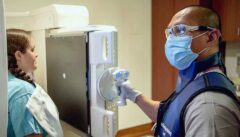Contents
Acquiring Oral & Maxillofacial Skills

UK health service career guides explain the reality of becoming an oral & maxillofacial consultant. A field where medical, dental and surgical training are essential.
If starting through dentistry, specialty training takes 13 years after your dental degree. Coming from a medical background, specialty training takes 11 years after a normally longer medical degree.
This would assume you moved directly into training from first qualification, which is not generally advised, or possible. There are good reasons to at least complete foundation training.
Alongside having the essential skills, experience counts in a field where there are three times as many applicants as specialty training places.
Making The Grade
Selectors in the UK provide a list of core traits likely to be needed beyond medical qualifications:
- Excellent communication skills and the ability to manage relationships with colleagues, patients, or their families.
- Emotional strength and a calm temperament, even under pressure. A wish to work in and lead a multidisciplinary team.
- Problem solving and diagnostic skills, an outstanding organisational ability and effective decision making skills.
- Sound resource and time management, whilst still having the physical stamina to cope with the demands of the job.
- A high degree of manual dexterity, with fine hand eye coordination, excellent vision, and visuospatial awareness.
That suitable applicants are hard to find is evident, due to the requirements and people understanding the level of dedication involved.
Even where specialty places are achieved, not all finish a rigorous process despite careful selection. Neither is a consultancy post an instant grant, with suitability and ability still key needs.
As we write this, there are 383 oral & maxillofacial consultants in the NHS and less in private practice. They have joined a small group, in a country with around 1.5 million people working in health care.
Is The Path Worthwhile
A US survey of oral & maxillofacial surgeons published in April 2023 backed up preceding research. 87% of respondents felt that if they had their career again, they would go through the same process.
This was not normally for financial reasons. On a career length basis, there are opportunities to spend less to qualify in other areas of medicine and earn more.
As with similar studies in the UK and Europe, their overall ability to treat patients was the leading factor. That the time and commitment invested in additional training equipped them beyond their hopes.
Of course there is a degree of pride in reaching the pinnacle of a profession but the driving factor in devoting a third of a working life to being able to work is to do so well.
When you meet any member of the oral & maxillofacial profession, we hope you agree that you are the reason they wanted to be where they are.
20 September 2024



